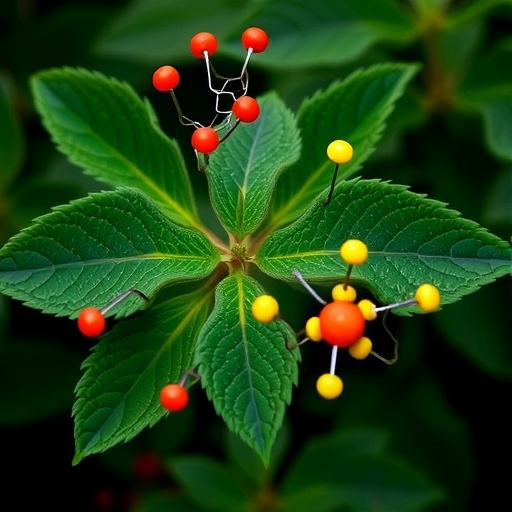In a groundbreaking advancement in plant biochemistry, researchers from Heinrich Heine University Düsseldorf (HHU) have unveiled a pivotal mechanism through which essential amino acids are transported within plants. These findings, recently published in the esteemed journal Nature Plants, elucidate how plants mobilize amino acids synthesized inside specialized organelles known as plastids, providing profound implications for crop biofortification and global food security.
Amino acids, often regarded as the fundamental building blocks of proteins, play indispensable roles across all living organisms. While humans can internally synthesize several amino acids, a subset termed “essential amino acids” must be sourced from external dietary providers, predominantly plants. Remarkably, plants possess the capacity to produce all 20 standard proteinogenic amino acids independently, positioning them as vital contributors to human nutrition. This new study casts light on how these substances are transported effectively within the plant system.
Prior research has long recognized that nine amino acids, including critical molecules such as lysine, arginine, and ornithine, are synthesized within plastids — cell organelles famously housing chloroplasts that facilitate photosynthesis. Until now, the molecular transporters governing the translocation of these amino acids from plastids to the rest of the plant organism remained enigmatic. Elucidating this transport pathway was essential for understanding both plant metabolism and amino acid distribution.
The research team led by Professor Dr. Andreas P. M. Weber made a major leap by identifying a specialized family of transport proteins, named RETICULATA1 (RE1), as the primary facilitators of basic amino acid movement across chloroplast membranes. These proteins are integral membrane carriers embedded in plastid envelopes, exhibiting high specificity for transporting positively charged amino acids such as arginine, citrulline, and lysine. This revelation marks a significant step in connecting gene function with physiological amino acid allocation.
The connection between RE1 and leaf morphology provides intriguing insights beyond biochemistry into plant developmental biology. It was previously known that mutations disrupting RE1 genes lead to conspicuous alterations in leaf shape — notably, a “reticulated” or net-like leaf pattern caused by deficient mesophyll cell development and disproportionate vein chloroplast populations. This phenotypic trait correlates directly with amino acid transport dysfunction, suggesting that nutrient distribution intricacies are closely linked to organ morphogenesis.
Dr. Franziska Kuhnert, the study’s lead author, explains that plants deficient in RE1 accumulate markedly lower quantities of basic amino acids both in the chloroplasts and overall leaf tissue. This depletion signifies a compromised intracellular exchange of nutrients, underscoring the crucial role of RE1 proteins in maintaining amino acid homeostasis. Furthermore, the complete knockout of RE1 along with its homolog RER1 proves lethal, thereby demonstrating the nonredundant and vital nature of these transporters.
Experimental analyses revealed that loss of RE1 not only hampers the supply of essential amino acids but also disturbs the balance of amino acid pools between plastids and the cytosol—the intracellular fluid environment where numerous metabolic processes occur. This disequilibrium leads to reduced biosynthesis rates for several basic amino acids, which could impair plant growth, stress responses, and overall fitness.
Evolutionary investigations show that RE1 proteins are ubiquitous in photosynthetic organisms containing plastids, including diverse plant species and photosynthetic algae. This widespread distribution suggests that RE1 emerged early during a pivotal evolutionary event known as endosymbiosis, when ancestral free-living bacteria were incorporated into host cells, giving rise to plastids. Thus, RE1 likely played an instrumental role in the adaptation and metabolic integration of plastids within the broader cellular architecture.
The implications of these findings extend far beyond academic curiosity. Understanding the molecular basis of amino acid transport opens exciting new avenues for agricultural biotechnology aimed at enhancing the nutritional content of food crops. By manipulating RE1 function or expression levels, scientists may breed plants with augmented amounts of essential amino acids, notably improving protein quality in staple foods and potentially mitigating malnutrition worldwide.
Professor Weber emphasizes that these results unveil an intricate connection between intracellular transport systems and macroscopic leaf development, an interrelationship that had been obscure until now. The ability to modulate basic amino acid translocation offers unprecedented potential for fine-tuning plant metabolism and growth characteristics, heralding transformative innovations in crop science.
The research was conducted within the framework of the CEPLAS Cluster of Excellence and supported by collaborative research centers funded by the German Research Foundation (DFG). Additionally, Dr. Peter K. Lundquist, a co-author, contributed under the auspices of an Alexander von Humboldt Postdoctoral Fellowship, underscoring the international and multidisciplinary nature of this endeavor.
In summary, the discovery of RETICULATA1 as a specialized plastid-localized transporter for basic amino acids represents a paradigm shift in our comprehension of plant amino acid metabolism. This breakthrough bridges molecular genetics, cellular physiology, and evolutionary biology, promising novel strategies to enhance crop nutritional qualities and addressing critical challenges in food security in the face of a growing global population.
Subject of Research: Amino acid transport mechanisms in plants, specifically the role of RETICULATA1 in plastid-mediated transport.
Article Title: RETICULATA1 is a Plastid-Localized Basic Amino Acid Transporter
News Publication Date: 22-Aug-2025
Web References: https://www.nature.com/articles/s41477-025-02080-z
References: Franziska Kuhnert, Philipp Westhoff, Vanessa Valencia, Stephan Krüger, Karolina Vogel, Peter K. Lundquist, Christian Rosar, Tatjana Goss and Andreas P. M. Weber. RETICULATA1 is a Plastid-Localized Basic Amino Acid Transporter. Nature Plants XXX (2025). DOI: 10.1038/s41477-025-02080-z
Image Credits: HHU/Franziska Kuhnert
Keywords: Amino acids, Plant cells, Plastid transport, RETICULATA1, Arabidopsis thaliana, Basic amino acid transporters, Chloroplast membranes, Plant biochemistry, Crop biofortification, Evolutionary biology




